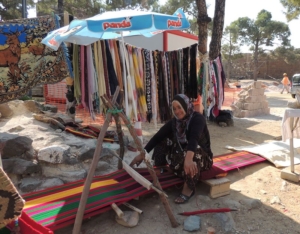Women’s Empowerment in Kurdistan
 Despite facing both gender and ethnic oppression, Kurdish women have significantly reshaped the political landscape of the Middle East. No other group in the region features a higher percentage of women in leadership roles. Kurdish women serve as guerrillas, human rights activists and members of parliament, championing gender equality while fostering peace, security and social empowerment. Their efforts extend beyond Kurdistan, influencing the Kurdish European diaspora and demonstrating how women’s empowerment is transforming society in Kurdistan.
Despite facing both gender and ethnic oppression, Kurdish women have significantly reshaped the political landscape of the Middle East. No other group in the region features a higher percentage of women in leadership roles. Kurdish women serve as guerrillas, human rights activists and members of parliament, championing gender equality while fostering peace, security and social empowerment. Their efforts extend beyond Kurdistan, influencing the Kurdish European diaspora and demonstrating how women’s empowerment is transforming society in Kurdistan.
Political Participation
A defining policy in Kurdish governance is the co-chair system, which legally mandates that all leadership positions be shared equally between men and women. This structure ensures that international diplomats engaging with Kurdish representatives meet with women and men in equal numbers. The ideological foundation of this movement is rooted in “jineology” or “the science of women.” Several Kurdish political organizations embrace this philosophy, with the Women’s Protection Units (YPJ) in northern Syria being the most well-known. This region, referred to as Rojava by Kurds, symbolizes Western Kurdistan and serves as a key example of gender equality in action.
While these reforms have created new opportunities for women, challenges remain. Political instability, conservative social structures and ongoing conflict in the region pose obstacles to full gender equality. Women participating in politics and military forces still face discrimination and resistance from traditional societal norms.
Advancing Gender Equality
Committed to promoting gender equality, the YPJ movement has established women-only organizations and mandated that half of all government funds be allocated to women’s initiatives. These ongoing efforts have led to significant legal reforms, including the outlawing of child marriage, a ban on polygamy and stronger mechanisms for women to report domestic abuse, with legal consequences for perpetrators.
The Kurdistan Regional Government (KRG) has also introduced legal protections for women’s rights. The Family Law enacted in 2011 provides statutory protection against gender-based violence, including practices like female genital cutting. However, gaps in enforcement persist and legal loopholes allow some discriminatory practices to continue. Provisions permitting husbands to discipline their wives and laws enabling rapists to avoid prosecution by marrying their victims highlight the ongoing need for legal reform. Despite these challenges, the establishment of such laws marks progress toward safeguarding women’s rights. It is a significant step in transforming Kurdish society.
Economic Empowerment and Breaking Cycles of Poverty
Economic independence plays a crucial role in advancing gender equality. Programs such as the Stronger Women, Stronger Nations initiative support vulnerable women, including Syrian, Yazidi and Iraqi refugees, through vocational training and economic empowerment strategies. These programs provide financial literacy training, employment opportunities and entrepreneurship support, enabling women to secure stable incomes.
Women who participate in these initiatives gain skills in various sectors, including agriculture, tailoring and business management. In addition to improving household income, these programs reduce economic dependence on male family members, offering women greater autonomy and social mobility. Despite these advancements, women in Kurdistan still face barriers to workforce participation, including societal expectations, limited access to higher education and economic policies that do not always prioritize female employment.
Looking Ahead
Kurdish women’s empowerment has already set a precedent for gender equality in the region. However, continued progress depends on further legal reforms, education access and economic opportunities. While Kurdish women’s leadership in governance, law and military forces has been groundbreaking, ongoing advocacy is needed to address legal gaps and social resistance.
By fostering long-term gender equality through political representation, legal protections and economic independence, women’s empowerment in Kurdistan is not only transforming communities but also shaping the future of the Middle East. Their achievements serve as a model for other regions striving for gender justice and social reform.
– Edzhe Miteva
Edzhe is based in London, UK and focuses on Good News and Politics for The Borgen Project.
Photo: Flickr
